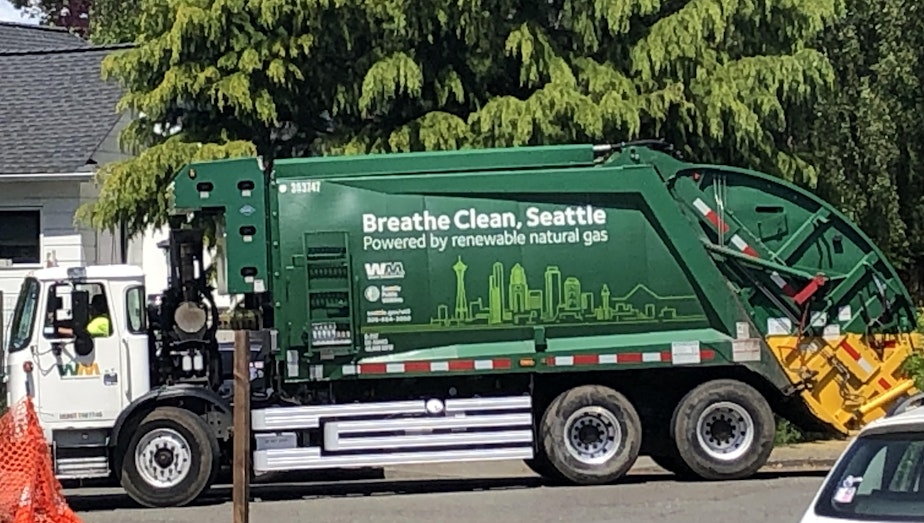Seattle to get garbage hauler to take down misleading green ads

Waste Management trucks in Seattle are plastered with advertisements on their sides: “Breathe Clean, Seattle: Powered by Renewable Natural Gas.”
Despite the ads and despite a contractual requirement to run the trucks on renewable fuel, those garbage trucks run on regular fossil-fuel natural gas, with all of its climate and pollution impacts.
After complaints from environmental activists, Seattle Public Utilities officials say they will get Waste Management to take down the ads.
“The slogans on the sides of WM’s trucks in Seattle are vague and could lead to confusion,” Seattle Public Utilities spokesperson Sabrina Register said in an email Wednesday. “We are currently working with WM to develop a plan to remove the slogans from all WM trucks that serve the Seattle Solid Waste Collections Contract.”
RELATED: Tacoma ship fire worse for climate than burning a million gallons of gasoline
“I’m really glad to hear that Waste Management will be removing the ads,” Seattle City Councilmember Lisa Herbold said. “But I also feel that we need to do more to move toward an all-electric fleet.”
Sponsored
Climate activists had complained to Seattle City Council that the ads were misleading “greenwashing” and that the polluting trucks appeared to be violating the city’s contractual requirements.
“The Contractor shall use 100% Renewable Natural Gas, as certified under the U.S. EPA renewable fuel program,” Waste Management’s 2018 contract for collecting garbage in North, Northwest, South, Southeast, and West Seattle states.
Instead of running its 92 garbage trucks in Seattle on biogas, Waste Management has been vacuuming up methane seeping out of landfills in Illinois, Kentucky, Ohio, Pennsylvania, and Texas. It uses that methane to fuel trucks in those cities, not Seattle, but claims credit for that activity in Seattle.
“This is how renewable energy works,” Waste Management spokesperson Jackie Lang said in an email. “It’s a ‘book and claim’ offset system similar to how renewable energy credits work for wind and solar.”
Sponsored
When an electricity consumer opts to pay extra for green power, the purchase injects more wind or solar power into the electrical grid somewhere, though it doesn’t necessarily come out of that consumer’s power outlets.
Lang said Waste Management has been collecting and using enough biogas from landfills back east to match its Seattle trucks’ fuel use since 2016.
By capturing methane that would otherwise waft from landfills, sewage plants, or manure lagoons into the atmosphere, renewable natural gas can help cool the climate.
RELATED: Underground fire, harmful fumes prompt cleanup plan for Yakima landfill
Methane traps 30 to 90 times more heat in the atmosphere than the carbon dioxide it turns into when it is burned.
Climate activists argue that biogas from sources like landfills can never meet more than a trivial share of the nation’s current demand for natural gas, almost all of which is pumped up from deep fossil reserves.
Sponsored
Reuters reports that biogas currently makes up less than 0.2% of the nation’s natural gas supplies.
“So-called renewable natural gas just helps industry appear like they’re cleaning up their act while continuing to drill and frack for more gas,” Jess Wallach with 350 Seattle told the Seattle City Council Transportation and Seattle Public Utilities Committee in February.
Seattle Public Utility officials say while the truck ads must come down, Waste Management is meeting its contractual obligation by capturing and using biogas elsewhere.
Under the contract, Seattle Public Utilities pays Waste Management about $30 million a year to collect garbage, recycling, and food waste.
Houston-based Waste Management had $19.7 billion in revenue in 2022, with a 28% profit margin, according to company’s latest earnings report.




